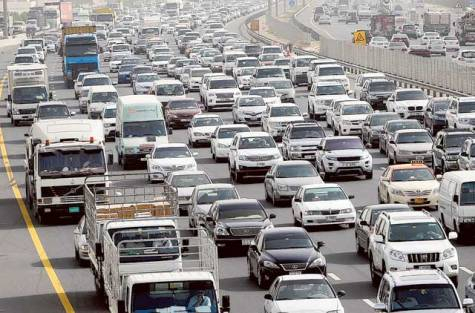
Dubai: Stuck in traffic? If we looked at the UAE, and specifically at Dubai including the commute to and from Sharjah, a driver spends an average of 21 hours a week in traffic.
That is 84 hours a month and 1008 hours a year, essentially 42 days in a year are spent behind the wheel, battling congestion.
That cannot be good for your health. Many readers complain of neck, shoulders and lower back issues. According to a report in the US-based The Atlantic, the average American commuter spends 38 hours in traffic annually, in high density cities.
Research published in the New England Journal of Medicine found that people caught in traffic are three times more likely to have a heart attack within the hour than those who are not stuck in a jam. The German study was based on interviews with 691 volunteers who survived a heart attack from 1999 to 2001.
According to the same study, heart attacks were found to be 2.6 times more common for people stuck in cars, 3.1 times higher for people taking public transportation, and 3.9 times greater for cyclists.
Hassan Saeed Siddiqui, a student at Fujairah Aviation Academy aged 21, travels daily between Dubai, Sharjah and Fujairah. He leaves home at 6am for a 9am class, to battle morning traffic. Whilst struggling with his long hours of study, Siddiqui also works in the evening at Mirdiff City Centre in Dubai. He leaves his class at 4pm, for his job as a sales merchandising manager that starts at 6pm. This means the evening congestion takes a toll, too. It takes him two hours to reach work. He finishes at 1am.
Siddiqui said: “This is causing a lot of stress and anxiety in my life. It is affecting my health. I’m exhausted from lack of sleep.” He doesn’t have a choice because of economic conditions.
The commuting also affects his family life. His parents are upset that they hardly see their son.
Additionally, driving late at night, in an exhausted state means his reflexes are slower. “Recently, a large truck to my right side did not check his blind spot whilst driving and kept driving into the left lane, where I was driving and another car was in the lane, too. So, I had no choice but to slow down and take a slow left in fear.”
Fatigue
The US-based National Sleep Foundation’s studies have linked sleepiness and fatigue to decreases in vigilance, reaction time, memory, psychomotor coordination, information processing, and decision making, all of which are needed for safe driving.
Sleepiness can impair driving performance as much or more so than alcohol, studies show. The American Automobile Association (AAA) estimates that one out of every six (16.5 per cent) deadly traffic accidents, and one out of eight (12.5 per cent) crashes requiring hospitalisation of car drivers or passengers is due to drowsy driving.
What would help Siddiqui? He said: “Make more routes for the Dubai-Sharjah roads, so it can be easier for us daily drivers to not get caught in as much traffic.”
Israr Ali is a 29-year-old sales executive working in Deira, Dubai. He spends almost three hours in traffic commuting to and from work in Sharjah and Al Quoz, on a daily basis. He told Gulf News that this is affecting his health in “distressful ways”.
When working over 10 hours a day, Ali complains that he suffers from “joint pains and exhaustion”. He cannot get medical help often because it is expensive, and this just makes his condition worse. Traffic is the bane of his existence.
Kiwannka Yazid a 28-year-old security guard shares the sentiment. He lives in Sharjah and works in Deira, Dubai. He travels by bus and has to arrive at work by 7am. He takes the bus at 5am every day. Usually there is a lot of traffic and this causes a lot of psychological stress and anxiety for Yazid worrying about “not arriving on time and causing trouble” for himself at work.
Longer commute, higher blood pressure
A 2012 study in the American Journal of Preventive Medicine found that the farther people commute by vehicle, the higher their blood pressure and body mass index is likely to be. Also, the farther the commute, the less physical activity the person was likely to get.
“I get really stressed with the congestion because I am worried about not reaching on time, along with that the traffic noise and heat give me severe headaches.” His duty extends for 12 hours a day.
Yazid has got medical help from his workplace and is being treated to help with the constant pain and exhaustion.
The Wall Street Journal reported that breathing normal city air with high levels of traffic exhaust for 90 days can change the way that genes turn on or off among the elderly. It can also leave a molecular mark on the genome of a newborn for life, separate research teams at Columbia University and Harvard University reported in 2014.
As roadways choke on traffic, researchers suspect that the tailpipe exhaust from cars and trucks, especially tiny carbon particles already implicated in heart disease, cancer and respiratory ailments, may also injure brain cells and synapses key to learning and memory.
These situations and statistics draws attention to the fact that traffic and time spent commuting need to be given far more individual attention for a healthier community.
= The writer is an intern with Gulf News










